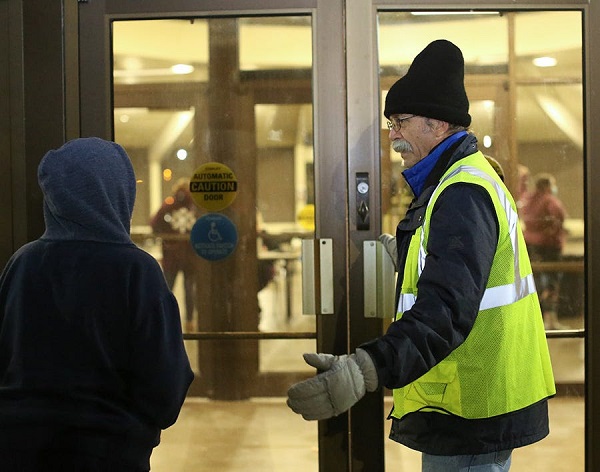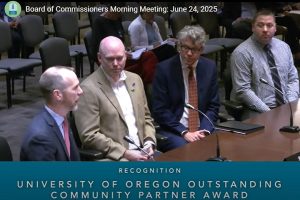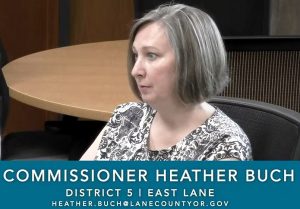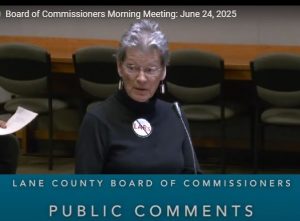Local government response to the ice storm: a collective moral failure
8 min read
by Marty Wilde
As I led a shift of five other volunteers at Egan Warming Center last week, I looked around and saw how hard we were working to make sure that the 120 unhoused in our care that night had food, shelter, and rest, despite the bitter temperatures and ice.
We were university staff, public employees, students, and senior citizens, all pulling together to make sure that no one would die on the streets that night. Our guests were old and young, sick and healthy, and had an astonishing variety of backgrounds. They all just needed a place to be so that they might have one more tomorrow.
I saw people working hard to support them, not because they expected pay, recognition, or even gratitude, but because we shared a common belief that everyone deserves that tomorrow.
As the activation went on, we saw how little local governments were willing to do to help us. The city closed public buildings and did not even try to clear major arteries until the second day. Lane Transit District refused to provide transportation. The county only opened Wheeler, the smallest building on the fairgrounds, to Egan, and then only at night. The school district did not open empty gyms to increase our capacity. They all said, in so many words, “It’s too dangerous!” or “It’s not our job!”
Well, it was not safe for volunteers to be there, either. The volunteers, many senior citizens, drove or walked over dangerous, icy roads to help those who needed us, because we knew that no one else would. It was not the church’s job to leave the heat on and allow the homeless to stay there – it was even closed by the district, yet the church leaders chose to honor their agreement to host Egan for the rest of the winter season.
It was not particularly safe for volunteers to drive the tired old shuttles from place to place. We all did it because it needed to be done to save lives.
The volunteers worked long hours. Because there were no safe public spaces for our guests, they routinely worked double the time they had signed up for. Although they lacked medical training and had very little in the way of medical supplies, they did their best to treat sick guests. We all swept and mopped, laundered soiled blankets and pallets, picked up garbage, and scrubbed pots. We did it because we care.
Despite professing to care, our local governments have done relatively little to demonstrate it. Despite the state’s loosening of siting requirements and providing substantial funding for shelters, we still lack an adequate public shelter, even just for emergencies such as this. And when the city decided that Egan should stay open a fourth night, despite the temperatures rising above our opening criteria, it proposed to do so with the same volunteers who had just worked the last three nights, not paid staff.
There’s a line between the prudent use of altruistic citizens and the exploitation of people of goodwill to do work that the government needs to do, but doesn’t want to. We crossed that line long ago. And if Big City Gamin’ can do its part for the unhoused, why can’t our local governments? As bar owner Britney Whitmer put it, “It’s important to us to do this because everybody matters.”
At the core of the problem is a lack of will. There is always a lack of resources, but, even when given those resources, our local officials have mostly chosen not to act. It is difficult, if you are a city councilor, to site a homeless shelter in your ward. It is inconvenient, if you are a transit board member, to insist that LTD provide emergency transportation to get volunteers to Egan sites and to provide transportation between those sites and whatever heated public spaces we have.
It was easy for the school board to open up Spencer Butte Middle School to housed neighbors who lost power during the last severe ice storm, but it was apparently too difficult to do so for our unhoused neighbors during this one.
While there was a failure of leadership at the executive levels of these organizations, I put the blame on the policy boards for our local governments. It is their job to provide the moral impetus to force their organizations to do the right thing. When an executive leader says, “Fixing homelessness not our job,” it is the political leaders’ job to tell them: “Yes, it is. We must all do what we can to help those in need.”
There are many other excuses with no factual basis:
- “Our public employees will object” neglects the reality that many of those employees volunteered to work in emergency roles during the pandemic, when they could more easily have stayed home and gotten paid for doing nothing.
- “Homelessness is a big problem” ignores the fact that providing emergency shelter to the unsheltered unhoused is actually not nearly as big a problem and can generally be accomplished using resources that already exist in the system, like empty public buildings.
- “We don’t have people trained to do that” overlooks the reality that most of the jobs needed don’t require any special training, just a willingness to help.
- “Liability” is a favorite fallback. When was the last time one of the unhoused sued a local government for providing them emergency shelter during a severe weather event? I’d be shocked if it has ever happened.
- But of all the excuses, the worst is: “We don’t have a budget for that.” Emergency shelters primarily rely on line items that have already been funded. Public buildings are heated during cold snaps, if for no other reason than to keep the pipes from freezing. Public employee salaries are usually paid even during weather shutdowns, meaning that there is no cost to allowing them to work “on the clock” when they volunteer to do so.
Board and council members write the budget. When they use the budget as an excuse, they’re not telling you that there’s something more important in their budget, they’re telling you that everything in their budget is more important to them than saving the lives of the unhoused in our community.
Oregonians love fractured local government because they like to elect local leaders to specific roles in which they see them as qualified. The challenge for us then becomes to choose leaders who will accept and even embrace a role in forcing their organizations to work together to meet the needs of our community, beyond the “silo” of their past work. And when those leaders object and say that they have taken some steps in the right direction, it become our job to ask, “Yes, but have you solved the problem?”
We have seen far too many half-measures and far too few signs of real progress. Solving homelessness is not a job for any one level of government – it is a job for all of them.
It’s not enough to elect someone who has the right values. Once we elect them, it becomes our job to push them have the courage to act on those values to solve the problems our community faces. You can do that now. I encourage you to write the County Commission, City Council, 4J School Board, and LTD Board, not to ask them what they did to address this problem, but to ask what they will do to solve the problem of homelessness in our community, or, at a bare minimum, to shelter our unhoused neighbors during the next cold snap.
If you don’t like the answer, I encourage you to vote for someone else next time. If you do, I hope you will hold them accountable for following through.
Although I started volunteering at Egan before I served in the Oregon Legislature, it took on a new meaning once I was in office. During my tenure there, we reduced obstacles to siting and passed record levels of support for low-income housing, shelter, and food. Nevertheless, volunteering with the unhoused helped me see how far we had to go and, often, how local government stood in the way of those efforts. I was often lobbied by local officials in Salem, but I never saw anyone else who was currently serving in federal, state, or local public office volunteering at Egan.
So, when a politician tells you that they’re doing everything they can, ask them when they did their last shift at Egan. I’d be happy to see them there.
A shout-out to Eugene Springfield Fire
Our paramedics and EMTs did a fantastic job. They will always have my gratitude.
While they are necessary, they are not sufficient to fill the all holes in our health care safety net. With CAHOOTS temporarily unable to provide medical screening and basic first aid because of the lack of a medical director, Lane County really should have stepped up to backstop that function. While this will undoubtedly provoke a “Not our job!” reaction, I would reply, “Isn’t it?”
When I picked up my cousin from her work at RiverBend Monday afternoon, there were 115 people in the emergency department. Providing basic medical screening and first aid in the field allows EMS to respond to the true emergency cases and our emergency departments to focus on the most needy. Just as we do for housing, we bear a collective responsibility to provide healthcare in our community. It shames me to see how often we fail because “It’s not our job” is the go-to answer for local government.
Our religious traditions emphasize serving those in need
In the U.S., the most widely-known message emphasizing the importance of serving the needy appears in the Book of Matthew:
“Then the King will say to those on his right, ‘Come, you who are blessed by my Father; take your inheritance, the kingdom prepared for you since the creation of the world. For I was hungry and you gave me something to eat, I was thirsty and you gave me something to drink, I was a stranger and you invited me in, I needed clothes and you clothed me, I was sick and you looked after me, I was in prison and you came to visit me.’
“Then the righteous will answer him, ‘Lord, when did we see you hungry and feed you, or thirsty and give you something to drink? When did we see you a stranger and invite you in, or needing clothes and clothe you? When did we see you sick or in prison and go to visit you?’
“The King will reply, ‘Truly I tell you, whatever you did for one of the least of these brothers and sisters of mine, you did for me.’ ” Matthew 25:34-40
Judaism, Islam, Buddhism, Bahai, and other religions have similar beliefs in the importance of serving the needy among us. Also, for a religious text that is generally about forgiveness and compassion, the New Testament is fairly unforgiving when it comes to those who fail to show compassion.
The views expressed herein are my own and not necessarily those of my employer or Egan Warming Center.
Volunteer or donate to Egan Warming Centers at https://www.svdp.us/services/shelter-assistance/egan-warming-centers/.
Marty Wilde represented central Lane and Linn counties in the Oregon legislature. For more of his Letters From a Recovering Politician, subscribe at https://martywilde.substack.com/subscribe.





